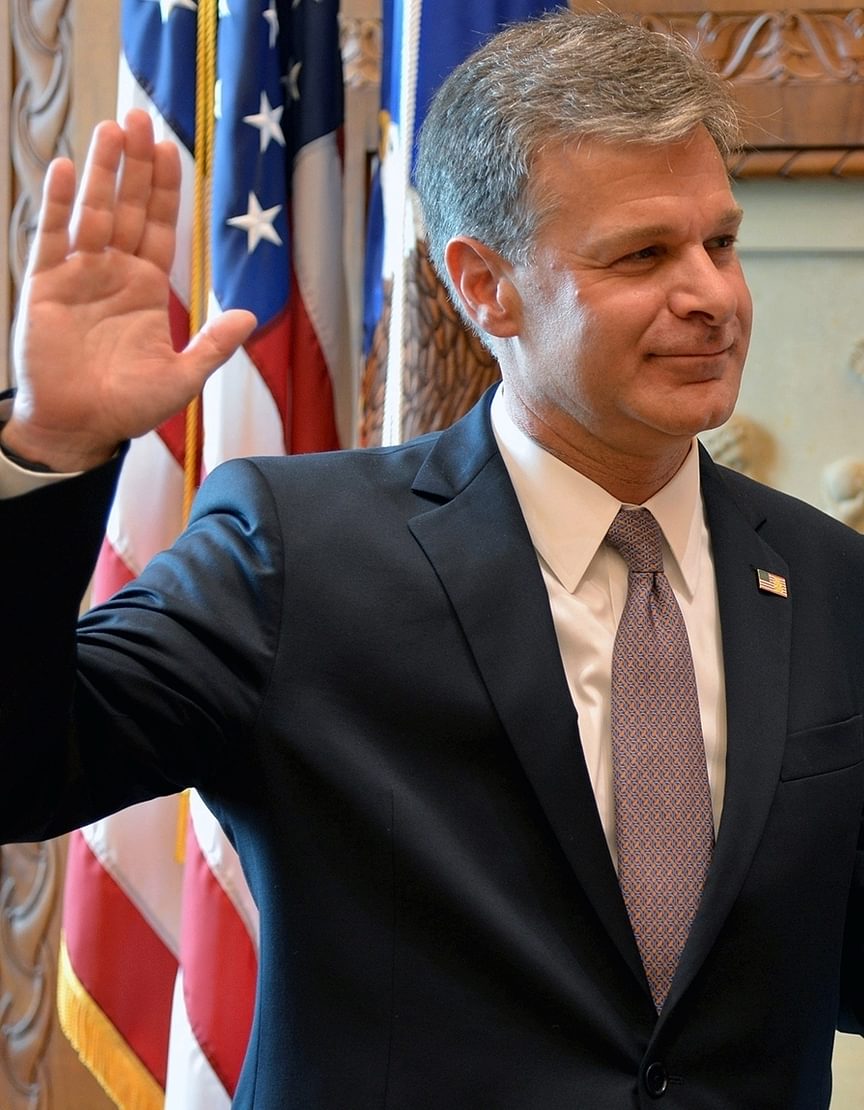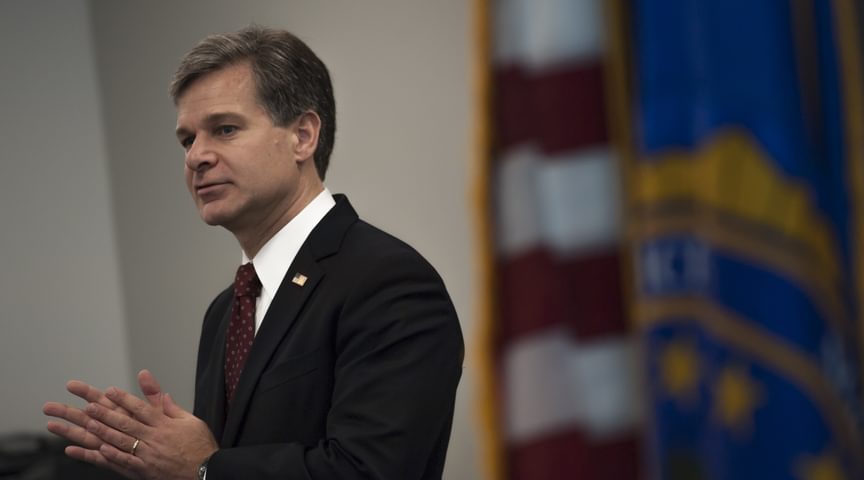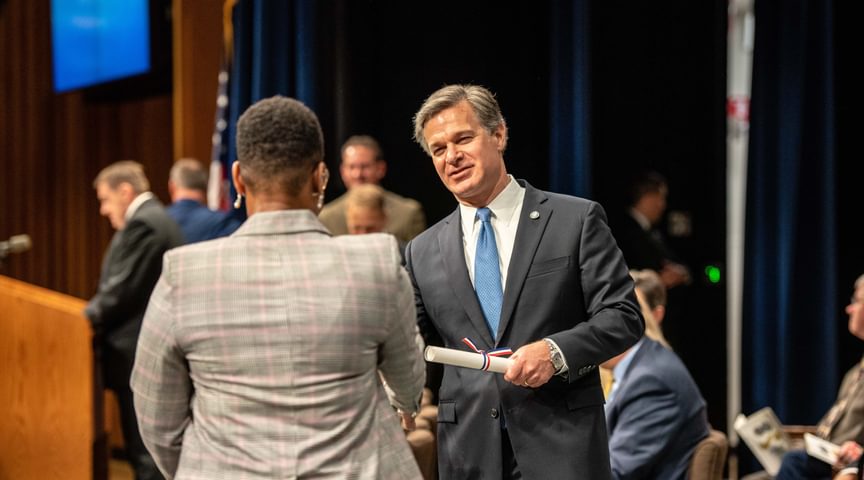
March 20, 2020
7 Questions With FBI Director Chris Wray ’85
In the Digital Age, Wray is leading efforts to analyze global terrorist connections and cyber security threatsby Rita Savard
We never know our future impact, especially upon entering high school. At Andover, Chris Wray ’85 was holding the rhythm in line via a Fender bass for the rock trio Fahrenheit 451 (with Pete McNulty ’85 and Ben Gundersheimer ’85). He played in several bands, was a varsity wrestler, and learned the value of teamwork on varsity crew (every oar-stroke from every rower affects the boat’s success). Protecting the United States from global threats was still some 30 years away, but the seeds of justice were being planted.
“The idea of a career in law began at Andover when I was introduced to critical thinking, logic, and ethics,” Wray says. “Teachers and coaches and tough classes like Proof and Persuasion with Tom Hodgson pushed me in ways and instilled habits that benefit me to this day.”
By his senior year, Wray was a disciplinary council representative in his West Quad North Cluster, making sure rules were enforced and that students were treated fairly in the process.
He earned his law degree from Yale Law School in 1992 and then joined the Atlanta-based law firm King & Spalding. Wray became an assistant U.S. Attorney in Georgia in 1997 and joined the Department of Justice’s leadership in 2001.
In 2003, he was nominated by President George W. Bush ’64 to serve as the assistant attorney general in charge of the Justice Department’s Criminal Division. There, Wray helped lead through a time of transition as the department pivoted to focus more on counterterrorism in the wake of 9/11. He repeatedly stressed that it was no longer sufficient for the FBI and the Justice Department to arrest terrorists after the fact—they had to prevent the attack in the first place.
In 2005, Wray returned to the private sector and defense attorney work at King & Spalding.
When he was named director of the FBI in 2017, after more than a decade’s absence from the Justice Department, Wray confronted new critical threats, including cyber, that were much less on the radar post 9/11. He tackles this new frontier every day, he says, with a deep respect and admiration for the FBI’s workforce.
To me, justice means doing the right thing in the right way. Our mission at the FBI is pretty simple to say, but profound to actually execute day in and day out: to protect the American people and uphold the Constitution.
”What role does technology play in the interconnections between people and justice?
Technology and its rapid evolution are central to almost everything we’re contending with at the FBI. Every time there is some innovative development, I have two reactions: Wow, that’s awesome—I can’t believe we can do that! And, oh no, guess who else can do that? Terrorism now moves at the speed of social media. We have hundreds of terrorism investigations involving folks here in the U.S. radicalized remotely by people overseas in a much more rapid way than before those tech advances. Cryptocurrency, the dark web, drones, cyberthreats—technology affects every kind of threat we face. Information of any value is a target for a wider-than-ever range of cyber attacks, and we rarely have a case now where, when we arrest someone, there aren’t multiple devices—and mountains of stored data to get through—that we seize as part of the investigation. It takes constant attention to stay ahead of the threats and on top of these challenges.
What is the most dramatic change you expect to see around national security in America?
Changes will be driven by the theme of tech. A close cousin is the increasingly cross-border or global dimension of the threats. The depth, sophistication, diversity, and agility of these threats are greater than ever. On the counterterrorism side, for example, it’s not just domestic but homegrown, jihadist-inspired violent extremists who are radicalized online or encouraged in chat rooms to conduct attacks they can do very quickly. Previously, the threat was a sleeper cell plotting a mass-casualty attack over a period of time. While that threat still exists, in today’s world you also have the loner individual online on his laptop who is going to get in his car and drive down a pedestrian walkway, shoot up a shopping mall, or build a crude IED from instructions available on the internet.
What does this mean for law enforcement?
The time in which we in law enforcement have to act is very compressed. The attack surface is broader than ever. Together, those make for a particularly challenging environment. The flipside is combatting these challenges through innovation and partnership. Just like the bad guys are more connected than they have ever been through technology, so are we—with our federal, state, local, and foreign law enforcement counterparts, or intelligence community colleagues, and increasingly in the private sector. And we have more means and access through our global partnerships than any other time in history.

What issue dominates the FBI’s counterintelligence program today?
The dominant theme is economic espionage, and overwhelmingly that traces back to China and affects almost every sector or industry in our country. As we speak, we have over 1,000 active investigations that involve attempted thefts of U.S.-based technology that lead back to China. It’s pretty breathtaking in scale, and economic security is national security. China’s approach to stealing innovation in any way it can—from businesses, universities, and other organizations—violates well-settled norms of fairness and integrity. It violates the rule of law. And the United States is not their only target. Even with all of our technological advances and capabilities, tackling this large-scale security threat will involve a whole-of-society approach on our end. The FBI has 37,000 people working for us—all dedicated to protecting America’s freedom and safety. But there are something like 325 million Americans, and we can’t tackle all of these threats on our own. Progress in stemming China’s threats will require strong and secure private and public sector partnerships. We’ve got to figure out more ways to work together.
How is the FBI working to prevent foreign attempts to hack future U.S. elections?
It’s a multi-partner effort combining the intelligence community, law enforcement, election officials, and—to a large extent—the private sector. From the FBI’s end, we look at it from the perspective of investigations from public corruption to counterintelligence to cyber. We’re also heavily involved in information sharing—with partners ranging from Silicon Valley to local and state law enforcement agencies—so all of the key participants are engaged and know what to be on the lookout for. Our focus is on building a strong network, raising awareness, and resilience. All of these things work together to make it harder to interfere with our election process.

In the growing conversation around data and justice, what should we be mindful of?
Well, I could pick a lot of examples. On the election influence side, the American people need to be more thoughtful consumers of information. The way in which information is disseminated today makes it particularly ripe for disinformation and propaganda and fabrication. People need to be discerning consumers about what they hear and ask themselves: Do I really know the source of this information? And, where is the source getting its information from? Always try to get a variety of information from different sources and be critical-thinking citizens. Our best defense is a thoughtful, well-informed voting public. We need to build resilience within the American people. There is no amount of investigating in a democracy like ours that can by itself sufficiently insulate the country. This is a shared effort between government, the private sector, and the voting public. On the data and security side, we need to be careful about not having false confidence, and to be very cautious about what personal information we share digitally.
Your career in law enforcement spans more than 20 years. How do you steer past politics and still find inspiration in your work?
My mantra is: We just need to stay focused on the work we do, who we do the work with, and who we do the work for—almost everything else is white noise and a distraction. The importance of staying locked-in on those things can be challenging, but our people in the FBI are very mission focused and at the end of the day, they don’t do the work for pundits or politicians. They do it because they love the idea of protecting the American people every day. I work with folks who are unbelievably inspiring public servants. I have been to all 56 of the FBI field offices around the country, every headquarters division, and a lot of our offices overseas. And there is not a day that goes by without encountering another example of courage, professionalism, and selflessness. I experience story after story of people doing amazingly heroic things—not just during their day jobs, but doing things like rescuing people from burning cars on their way home from work. It’s part of the DNA of this workforce. Whenever I feel like I’m dragging a bit, I’m always only moments away from another inspiring story of incredible human strength, kindness, courage, and sacrifice.
Read about more Andover alumni working in fields of justice.





